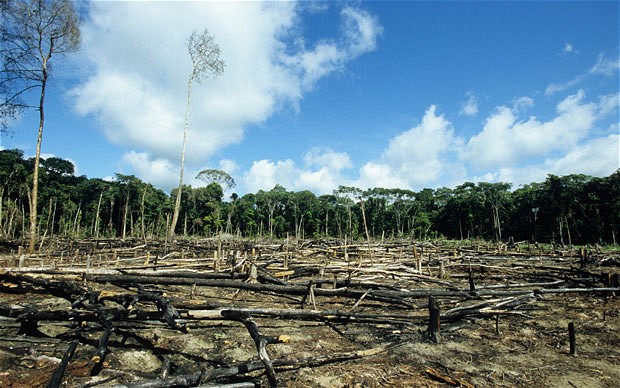BirdLife Partners and other NGOs in Cote d’Ivoire, Ethiopia, Nigeria, and Rwanda are amongst the Top 100 Restoration Projects funded by TerraFund for AFR100, which recently announced its cohort of 100 local innovators and enterprises in 27 countries to deliver pioneering tree restoration projects towards a prosperous, net-zero-emissions future for Africa

As part of the United Nations (UN) Decade on Restoration (2021-2030), 32 African governments pledged to begin restoring 100 million hectares of degraded land by 2030 through the AFR100 Initiative. The African Union Development Agency (AUDA-NEPAD), World Resources Institute (WRI), Germany’s Federal Ministry for Economic Cooperation and Development (BMZ) and the World Bank launched the initiative at COP21 in Paris in 2015, with AUDA-NEPAD acting as the AFR100 Secretariat.
With support from TerraFund for AFR100, a financing facility led by WRI, One Tree Planted, Realize Impact, BirdLife International and a number of its national partners will lead on these restoration efforts in Cote d’Ivoire, Ethiopia, Nigeria, and Rwanda, aimed at reversing land degradation and deforestation to fight climate change, boosting food security, and helping rural communities thrive. The tree planting work will begin almost immediately, with survival rates, tree coverage and socioeconomic impacts monitored for years to come.
In Rwanda, BirdLife will partner with Nature Rwanda to restore 500 hectares (ha) of severely degraded montane land in Lake Kivu and Rusizi river basin, a biodiversity rich area which includes 15 Key Biodiversity Areas (KBAs) and hosts 71 endangered and endemic species. The watersheds also provide ecosystem services such as water, food and energy to over 2 million basin inhabitants, but are highly vulnerable to soil erosion, land degradation, and sedimentation.
This project will focus on two sites in Butare and Bweyeye sectors in Rwanda, working with local communities and local government to increase climate resilience and improve the livelihoods of 25,000 people by establishing a community nursery and planting 300,000 trees (285,000 agroforestry trees and 15,000 fruit trees).
“As we are facing climate change, we must consider bold actions and investments to build resilient communities,” noted Jean Claude Dusabimana, Executive Director, Nature Rwanda. “BirdLife International is really pleased to continue the work begun in this region in Rwanda and Burundi to establish Climate Resilient Altitude Gradients (CRAGS), working alongside Nature Rwanda.”
“We are also overjoyed to see a number of BirdLife Partners amongst the 100 successful projects,” said Ken Mwathe, Policy and Communications Coordinator at BirdLife Africa.
In Cote d’Ivoire, SOS-Forêts will help restore 150 ha of tree cover in Mount Tia classified forest, in western Côte d’Ivoire’s Kouibly District, which has been replaced by intensive cocoa cultivation leading to land degradation and soil erosion. The project will raise awareness and build capacity of local communities for their active participation in the management of natural resources and biodiversity, to restore degraded ecosystems and create community forests in addition to agroforests, in partnership with cocoa and forests associations.
In Ethiopia, the grant will enable Nature and Biodiversity Conservation Union (NABU) to bring to fruition, a collaborative forest action plan for the Kafa Zone in the country’s South Western region, affected by deforestation, forest degradation and fragmentation, coupled with climate change induced impacts due to population growth, and agriculture, thus threatening the Zone’s rich biodiversity and the livelihoods of forest dependent communities.
Restoration of 1000 ha of degraded forest areas through creating connectivity between fragmented habitats and developing agroforestry systems that mix native and fruit trees with high-value spices like black pepper and cardamom, will help regain and maintain ecological functionality of the region’s unique natural forest landscapes and provide local communities with ecologically sensible and profitable livelihoods.
In Nigeria, the Nigerian Conservation Foundation (NCF) will support restoration of 200 ha degraded forests managed by Nnamdi Azikiwe University, the remnants of natural forest in southeast Nigeria and two NCF-owned forests located at Ajingi, Kano and Abuja Conservation Centre (ACC), in the northern Savannah region of Nigeria.
The sites harbour biological resources, particularly indigenous plants and animal species, that provide essential services to the environment. The restoration effort will contribute to improving Nigeria’s forest cover, currently reported as less than 4%.
In total, more than 1,850 hectares of forests will be restored across the four countries, based on the 4Rs Principles: the Right trees (replanting or natural regeneration of native trees including rare/endangered species) in the Right place (prioritising connecting/expanding standing natural forest), with the Right stakeholders (working with and for Indigenous Peoples and local communities) using the Right means (considering capacity, funding and sustainability).
Outcomes of these restoration efforts will focus on the 4Cs: expanding ecosystem Cover, improving its Condition (ecosystem integrity and biodiversity) and Carbon, and supporting Communities that depend on it.
